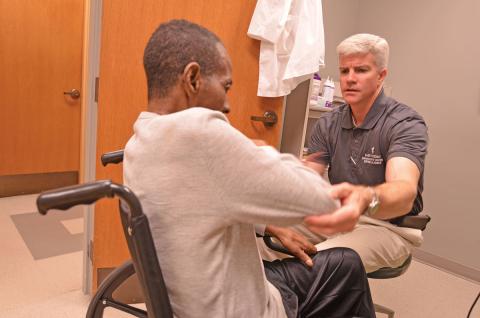Streamlined services: Methodist Rehab’s new CORE clinic consolidates care for patients needing multiple appointments

For many patients who have suffered a disabling injury or illness, just getting to a doctor’s appointment can be an undertaking.
And for those that need to see several clinicians for a variety of needs, having to make multiple appointments can make their lives needlessly difficult.
“There are patients with stroke, spinal cord injury and other disabilities who live in the community and need to have access to a setting where they can see different skilled professional providers under one roof,” said Dr. Philip Blount of Methodist Pain & Spine Center.
Enter Methodist Outpatient Services’ CORE (Comprehensive Outpatient REhabilitation) Clinic, which offers the convenience of providing a variety of services all in a single appointment.
“I truly believe this provides the best case scenario for patients,” said Chris Wallace, director of Methodist Orthotics & Prosthetics. “This integrated approach allows for greater interaction and dynamic dialogue among the key rehabilitation professionals involved in the patient’s care.”
CORE brings together staff from all the disciplines at Methodist Rehab’s facility in Flowood.
The patient’s overall care is overseen by Blount, a physical medicine and rehabilitation physician. Blount joined the Methodist staff in January.
“When I first came over here to work, I was quickly made aware of the broad scope of professional services available,” Blount said. “When patients started coming from over an hour away requiring these multiple specialties, I communicated with the group and was able to work together with the various leaders here at outpatient to make this clinic available.”
“Having a physician such as Dr. Blount who is excited and fully engaged in this process and is willing to provide dynamic leadership to the team further increases the scope and depth of the clinic’s offerings,” Wallace said.
Wallace leads his team of Orthotics & Prosthetics staff, who address patient concerns related to improving functional mobility through the use of prosthetic or orthotic devices.
“O&P has used this team model for many years in the amputee clinic,” Wallace said. “Expanding this model to include other disciplines only increases the capabilities and services offered to patients, which improves the outcome potential.”
Physical therapist Lisa Indest screens the patient’s needs for physical, occupational and speech therapy services.
“I determine what types of functional impairments that they’re having and look at their therapy history to decide if any of those disciplines are required,” Indest said. “I also help evaluate upper and lower extremity spasticity to help Dr. Blount determine if injections in those muscles would be beneficial.”
Clinical psychologist Danny Burgess, Ph.D., of Quest addresses any behavioral or emotional issues related to the patient’s medical situation.
“This can range from helping them manage depression/anxiety symptoms, improve compliance with treatment recommendations, help them quit tobacco use, as well as make recommendations for psychotropic medication use,” Burgess said.
Physical therapist Allison Fracchia of the Assistive Technology Clinic addresses whether or not the patient is having issues with their current mobility device or if they need new recommendations.
“Often these discussions lead to questions about transporting the wheelchair or transferring into and out of the device,” Fracchia said. “The discussions also bring up complications such as pressure sores or poor positioning that can lead to other medical problems.”
The AT Clinic’s involvement is something that truly sets CORE apart.
“There are very few physical therapists nationally who concentrate their daily practice on only seating and mobility assessments,” Fracchia said. “We have three therapists who spend their time doing these types of assessments all day.”
Currently, CORE clinic takes place one day a month, with plans to expand and offer more options for appointments. Blount hopes to add more services such as an on-site urologist to help patients with bowel and bladder incontinence.
“The idea is for this clinic to serve as another step on the patient’s road to successful community living,” Blount said.
While CORE’s approach benefits the patient in numerous ways, its team members are also finding surprising ways it benefits them as clinicians.
“I am able to take a more holistic approach with my patients because I am aware of their needs in multiple areas,” Burgess said.
“This collaboration builds team unity among the professions and serves to provide ongoing education for us all,” Wallace said.
Above all, CORE offers a quality of care that only comes through personal interaction.
“Not only is our clinic face-to-face with the patient, it’s face-to-face with my fellow providers,” Blount said. “I’m always amazed at what the team presents as possible options.”
For more information about how to schedule an appointment with Methodist Outpatient Services’ CORE Clinic, please call 601-936-8888.